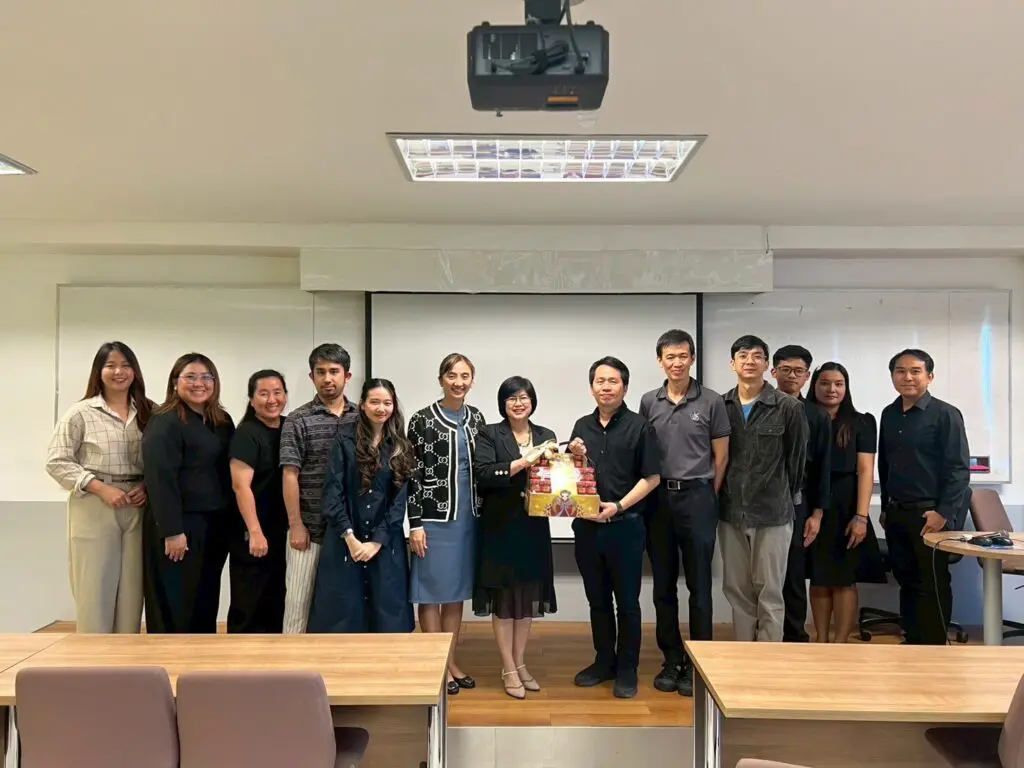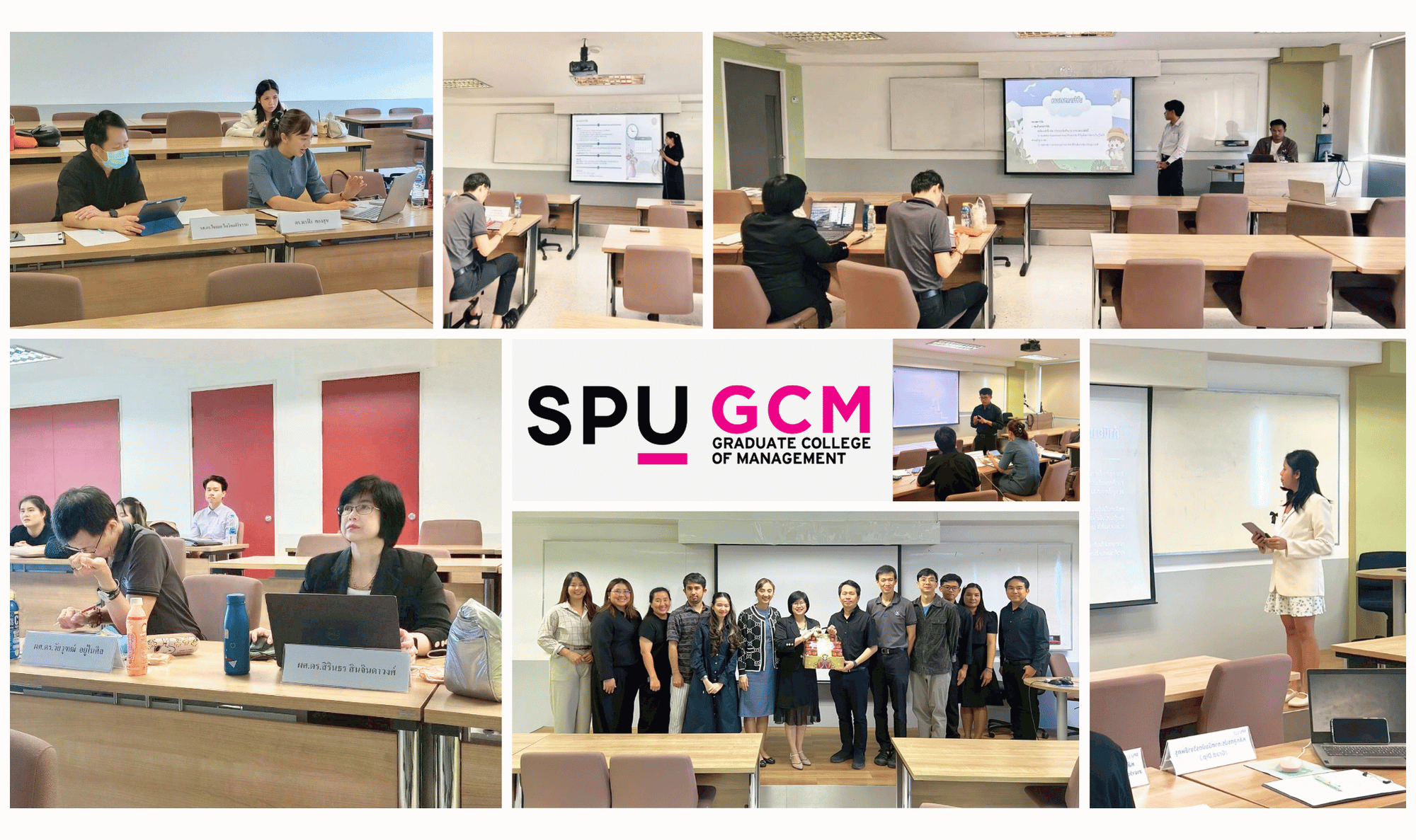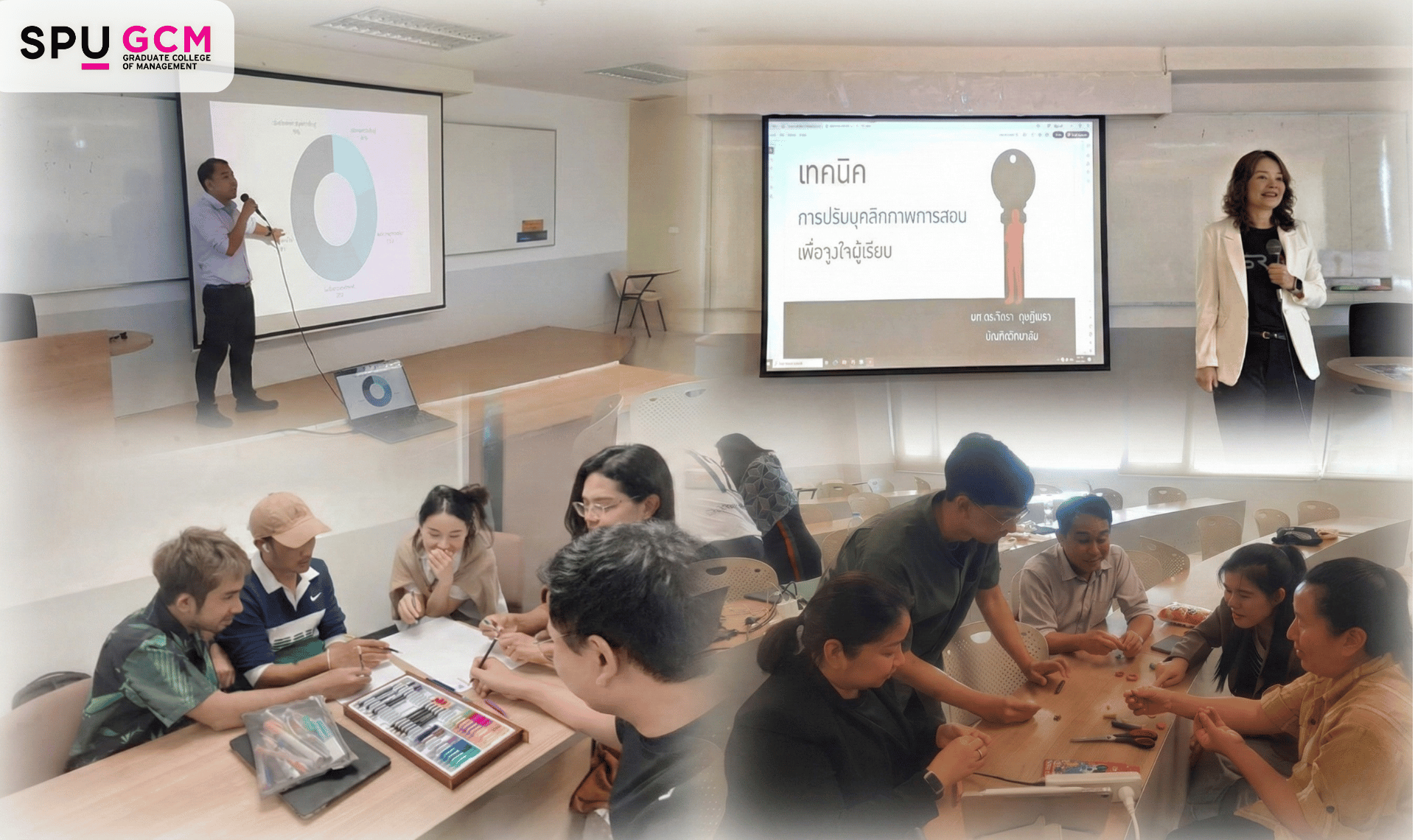ก้าวสำคัญของว่าที่ครูมืออาชีพกับการนำเสนองานวิจัยในชั้นเรียน
วันอาทิตย์ที่ 16 พฤศจิกายน พ.ศ. 2568 หลักสูตรประกาศนียบัตรบัณฑิตวิชาชีพครู วิทยาลัยบัณฑิตศึกษาด้านการจัดการ มหาวิทยาลัยศรีปทุม ได้จัดกิจกรรม การนำเสนองานวิจัยในชั้นเรียน (Classroom Research) อย่างเข้มข้น โดยมีวัตถุประสงค์เพื่อส่งเสริมให้นักศึกษาได้ฝึกปฏิบัติการวิจัยเชิงประยุกต์ นำความรู้ด้านการสอนมาพัฒนากระบวนการเรียนการสอนในชั้นเรียนจริง และยกระดับคุณภาพวิชาชีพครูอย่างเป็นระบบ
กิจกรรมครั้งนี้ได้รับเกียรติจากคณะกรรมการผู้ทรงคุณวุฒิทั้ง ภายในและภายนอก ร่วมประเมินและให้คำแนะนำเชิงวิชาการอย่างเข้มข้น ได้แก่
กรรมการภายนอก
- รศ.ดร. ไชยยศ ไพวิทยธรรม
ประธานคณะกรรมการบริหารหลักสูตรศึกษาศาสตรมหาบัณฑิต
สาขาวิธีวิทยาการวิจัยทางการศึกษา มหาวิทยาลัยศิลปากร - ผศ.ดร. วัยวุฑฒ์ อยุในศิล
หัวหน้าสาขาการวิจัยและพัฒนาหลักสูตร
บัณฑิตวิทยาลัย มหาวิทยาลัยศรีนครินทรวิโรฒ ประสานมิตร
กรรมการภายใน
- ผศ.ดร. สิรินธร สินจินดาวงศ์
- ดร. พรฟ้า ทองสุข

คณะกรรมการได้มอบคำแนะนำเชิงลึกทั้งด้าน กระบวนการวิจัย การออกแบบการเรียนการสอน การวิเคราะห์ข้อมูล และ การประยุกต์ใช้ผลการวิจัยในชั้นเรียน ซึ่งช่วยให้นักศึกษาเข้าใจจุดแข็งและจุดที่ควรพัฒนา เพิ่มความมั่นใจในการสร้างงานวิจัยที่มีคุณภาพและสามารถนำไปใช้ได้จริง
การนำเสนองานวิจัยครั้งนี้ถือเป็น ก้าวสำคัญของนักศึกษาครูมืออาชีพ เพราะนอกจากจะเป็นการทบทวนองค์ความรู้และเทคนิคการสอนแล้ว ยังเป็นเวทีให้ผู้เรียนได้ แลกเปลี่ยนความคิดเห็น ฝึกการสื่อสารเชิงวิชาการ และรับฟังข้อเสนอแนะ ที่เป็นประโยชน์ต่อการพัฒนางานวิจัยของตนเองในอนาคต
วิทยาลัยบัณฑิตศึกษาด้านการจัดการ มหาวิทยาลัยศรีปทุม มุ่งมั่นผลิตครูคุณภาพ พร้อมให้ความรู้และฝึกฝนทักษะที่จำเป็นต่อการจัดการเรียนการสอนอย่างมีประสิทธิภาพ ทั้งในด้าน ทักษะวิชาการ ทักษะวิจัย และทักษะการสื่อสาร เพื่อพัฒนาครูมืออาชีพที่สามารถสร้างการเรียนรู้คุณภาพสูงแก่ผู้เรียนได้อย่างยั่งยืน
แนวทางการดำเนินงานนี้สะท้อนบทบาทสำคัญของมหาวิทยาลัยในการสนับสนุนเป้าหมายการพัฒนาที่ยั่งยืนระดับสากล โดยสามารถเชื่อมโยงกับ SDGs ดังต่อไปนี้
SDG 4: คุณภาพการศึกษา (Quality Education)
เป้าหมายย่อย 4.3 — การเข้าถึงการศึกษาระดับอุดมศึกษาและฝึกอบรมวิชาชีพที่มีคุณภาพ
กิจกรรมการนำเสนองานวิจัยในชั้นเรียนครั้งนี้ มุ่งเน้นให้นักศึกษาได้ฝึกปฏิบัติการวิจัยเชิงประยุกต์และพัฒนาทักษะการสอนในชั้นเรียนจริง ซึ่งเป็นส่วนสำคัญของการพัฒนาคุณภาพการศึกษา การสร้างโอกาสให้นักศึกษาครูได้ฝึกปฏิบัติอย่างเข้มข้น ช่วยยกระดับความรู้ ทักษะ และประสบการณ์วิชาชีพตรงตามเป้าหมายย่อย 4.3 ที่ต้องการให้ทุกคนสามารถเข้าถึงการศึกษาระดับสูงและการฝึกอบรมที่มีคุณภาพ
เป้าหมายย่อย 4.c — เพิ่มจำนวนครูที่มีคุณวุฒิและผ่านการพัฒนาอย่างเหมาะสม
การประเมินและให้คำแนะนำเชิงวิชาการจากคณะกรรมการผู้ทรงคุณวุฒิทั้งภายในและภายนอกมหาวิทยาลัย ช่วยให้นักศึกษาครูเข้าใจจุดแข็งและจุดที่ควรพัฒนา พัฒนาความมั่นใจในการสร้างงานวิจัยและการสอนอย่างมีคุณภาพ การเสริมทักษะวิชาการ การวิจัย และการสื่อสารนี้เป็นการสร้างความพร้อมให้ครูมืออาชีพ สามารถจัดการเรียนรู้ได้อย่างมีประสิทธิภาพ สอดคล้องกับเป้าหมายย่อย 4.c
SDG 8: งานที่มีคุณค่าและการเติบโตทางเศรษฐกิจ (Decent Work and Economic Growth)
เป้าหมายย่อย 8.6 — เพิ่มโอกาสให้เยาวชนได้รับทักษะที่จำเป็นสำหรับการทำงาน
การฝึกฝนทักษะวิชาการและทักษะการวิจัยของนักศึกษาครู ถือเป็นการเตรียมความพร้อมสำหรับการประกอบอาชีพครูอย่างมีคุณภาพ นอกจากจะสร้างศักยภาพในการสอนแล้ว ยังเป็นการเพิ่มโอกาสให้เยาวชนเข้าสู่ตลาดงานด้วยทักษะที่ตอบโจทย์อาชีพและการเติบโตอย่างยั่งยืน สอดคล้องกับเป้าหมายย่อย 8.6
SDG 17: ความร่วมมือเพื่อเป้าหมาย (Partnerships for the Goals)
เป้าหมายย่อย 17.16 — ส่งเสริมความร่วมมือระหว่างสถาบันการศึกษาและผู้เชี่ยวชาญ
กิจกรรมนี้เป็นเวทีแลกเปลี่ยนความรู้ระหว่างนักศึกษา ครู และคณะกรรมการผู้ทรงคุณวุฒิจากหลายมหาวิทยาลัย ทั้งภายในและภายนอก SPU การร่วมมือเชิงวิชาการนี้ช่วยสร้างเครือข่ายความรู้และความร่วมมือที่เข้มแข็ง สนับสนุนการพัฒนาทักษะครูมืออาชีพ และสอดคล้องกับเป้าหมายย่อย 17.16
A Significant Milestone for Future Educators: Advancing Professionalism through Classroom Research Presentations
On Sunday, November 16, 2025, the Graduate Diploma Program in Teaching Profession at the Graduate College of Management, Sripatum University (SPU), organized an intensive “Classroom Research Presentation” session. The primary objective of this initiative was to encourage students to engage in applied research, utilizing pedagogical knowledge to enhance actual teaching processes and systematically elevate the quality of the teaching profession.
The event was honored by a panel of distinguished experts from both external institutions and within the university, who provided rigorous assessment and academic guidance. The committee included:
External Committee Members:
- Assoc. Prof. Dr. Chaiyos Paiwithayasiritham – Chairman of the Master of Education Program Executive Committee in Educational Research Methodology, Silpakorn University.
- Asst. Prof. Dr. Waiwut Ayunaasil – Head of the Department of Curriculum Research and Development, Graduate School, Srinakharinwirot University (Prasarnmit).
Internal Committee Members:
- Asst. Prof. Dr. Sirinthon Sinjindawong
- Dr. Pornfa Thongsuk
The committee provided in-depth recommendations covering research methodology, instructional design, data analysis, and the practical application of research findings in the classroom. This comprehensive feedback enabled students to identify their strengths and areas for improvement, thereby boosting their confidence in conducting quality research with tangible applications.
This presentation marks a pivotal step for these prospective professional teachers. Beyond reviewing knowledge and teaching techniques, it served as a platform for exchanging ideas, practicing academic communication, and receiving constructive feedback beneficial for their future research endeavors.
The Graduate College of Management at Sripatum University remains committed to producing high-quality educators. The institution is dedicated to equipping students with essential skills for effective teaching management including academic proficiency, research capabilities, and communication skills to develop professional teachers capable of fostering sustainable, high-quality learning for their students.
Alignment with Sustainable Development Goals (SDGs)
To underscore the university’s dedication to global educational standards, this Classroom Research initiative aligns with the following SDGs:
SDG 4: Quality Education
Target 4.3 — Ensure equal access to affordable and quality technical, vocational, and tertiary education
This classroom research presentation initiative aims to provide students with hands-on experience in applied research and the development of practical teaching competencies. Such preparation is essential for improving the overall quality of education. By offering intensive, practice-based learning opportunities, the program enhances students’ knowledge, skills, and professional readiness, fully aligning with Target 4.3, which emphasizes equitable access to quality higher education and relevant training.
Target 4.c — Substantially increase the supply of qualified teachers through adequate training
The academic evaluation and expert feedback provided by qualified committees, both internal and external to the university, enable student-teachers to identify their strengths and areas for improvement. This process strengthens their confidence in producing high-quality research and delivering effective instruction. The enhancement of academic, research, and communication skills ensures that future educators are well-prepared to manage learning environments competently, in accordance with Target 4.c.
SDG 8: Decent Work and Economic Growth
Target 8.6 — Reduce the proportion of youth not in employment, education, or training
The development of academic and research skills among student-teachers serves as essential preparation for entering the teaching profession with quality and professionalism. Beyond strengthening their instructional capabilities, this training equips young people with relevant competencies needed in the labor market, thereby expanding their career opportunities and supporting sustainable economic participation, consistent with Target 8.6.
SDG 17: Partnerships for the Goals
Target 17.16 — Enhance global partnerships for sustainable development
This initiative provides a collaborative platform for knowledge exchange among students, educators, and distinguished experts from multiple institutions, both within and outside SPU. Such academic partnerships foster robust networks that enhance professional learning, support the development of qualified educators, and align closely with Target 17.16, which promotes multi-stakeholder collaboration for sustainable development.








